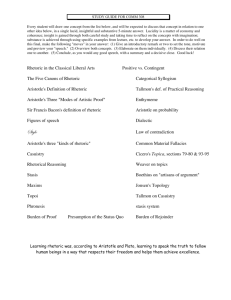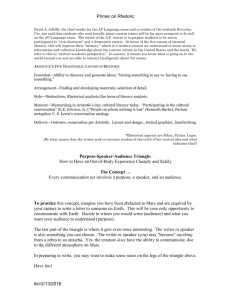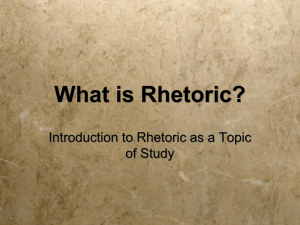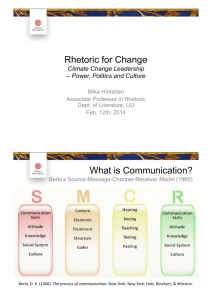Chapter Two, p. 2
advertisement
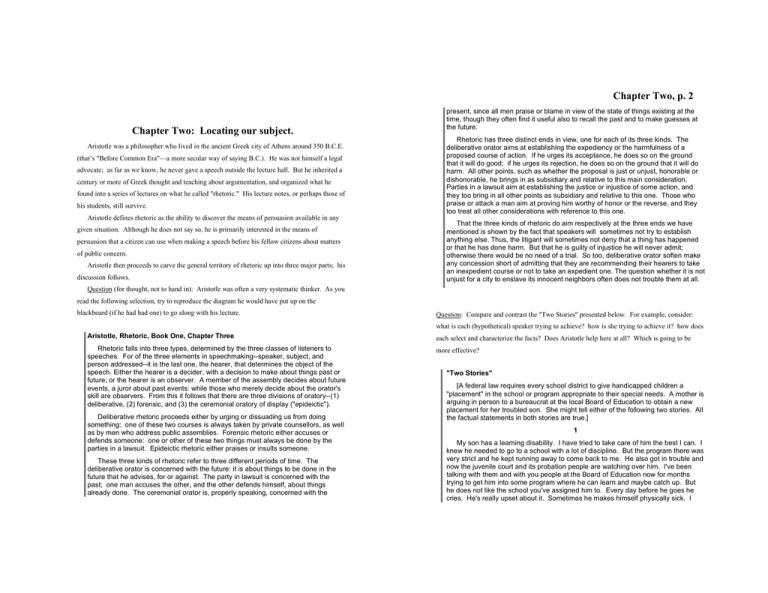
Chapter Two, p. 2 Chapter Two: Locating our subject. Aristotle was a philosopher who lived in the ancient Greek city of Athens around 350 B.C.E. (that’s "Before Common Era"—a more secular way of saying B.C.). He was not himself a legal advocate; as far as we know, he never gave a speech outside the lecture hall. But he inherited a century or more of Greek thought and teaching about argumentation, and organized what he found into a series of lectures on what he called "rhetoric." His lecture notes, or perhaps those of his students, still survive. Aristotle defines rhetoric as the ability to discover the means of persuasion available in any given situation. Although he does not say so, he is primarily interested in the means of persuasion that a citizen can use when making a speech before his fellow citizens about matters of public concern. Aristotle then proceeds to carve the general territory of rhetoric up into three major parts; his discussion follows. present, since all men praise or blame in view of the state of things existing at the time, though they often find it useful also to recall the past and to make guesses at the future. Rhetoric has three distinct ends in view, one for each of its three kinds. The deliberative orator aims at establishing the expediency or the harmfulness of a proposed course of action. If he urges its acceptance, he does so on the ground that it will do good; if he urges its rejection, he does so on the ground that it will do harm. All other points, such as whether the proposal is just or unjust, honorable or dishonorable, he brings in as subsidiary and relative to this main consideration. Parties in a lawsuit aim at establishing the justice or injustice of some action, and they too bring in all other points as subsidiary and relative to this one. Those who praise or attack a man aim at proving him worthy of honor or the reverse, and they too treat all other considerations with reference to this one. That the three kinds of rhetoric do aim respectively at the three ends we have mentioned is shown by the fact that speakers will sometimes not try to establish anything else. Thus, the litigant will sometimes not deny that a thing has happened or that he has done harm. But that he is guilty of injustice he will never admit; otherwise there would be no need of a trial. So too, deliberative orator soften make any concession short of admitting that they are recommending their hearers to take an inexpedient course or not to take an expedient one. The question whether it is not unjust for a city to enslave its innocent neighbors often does not trouble them at all. Question (for thought, not to hand in): Aristotle was often a very systematic thinker. As you read the following selection, try to reproduce the diagram he would have put up on the blackboard (if he had had one) to go along with his lecture. Question: Compare and contrast the "Two Stories" presented below. For example, consider: what is each (hypothetical) speaker trying to achieve? how is she trying to achieve it? how does Aristotle, Rhetoric, Book One, Chapter Three each select and characterize the facts? Does Aristotle help here at all? Which is going to be Rhetoric falls into three types, determined by the three classes of listeners to speeches. For of the three elements in speechmaking--speaker, subject, and person addressed--it is the last one, the hearer, that determines the object of the speech. Either the hearer is a decider, with a decision to make about things past or future; or the hearer is an observer. A member of the assembly decides about future events, a juror about past events: while those who merely decide about the orator's skill are observers. From this it follows that there are three divisions of oratory--(1) deliberative, (2) forensic, and (3) the ceremonial oratory of display ("epideictic"). more effective? Deliberative rhetoric proceeds either by urging or dissuading us from doing something: one of these two courses is always taken by private counsellors, as well as by men who address public assemblies. Forensic rhetoric either accuses or defends someone: one or other of these two things must always be done by the parties in a lawsuit. Epideictic rhetoric either praises or insults someone. These three kinds of rhetoric refer to three different periods of time. The deliberative orator is concerned with the future: it is about things to be done in the future that he advises, for or against. The party in lawsuit is concerned with the past; one man accuses the other, and the other defends himself, about things already done. The ceremonial orator is, properly speaking, concerned with the "Two Stories" [A federal law requires every school district to give handicapped children a "placement" in the school or program appropriate to their special needs. A mother is arguing in person to a bureaucrat at the local Board of Education to obtain a new placement for her troubled son. She might tell either of the following two stories. All the factual statements in both stories are true.] 1 My son has a learning disability. I have tried to take care of him the best I can. I knew he needed to go to a school with a lot of discipline. But the program there was very strict and he kept running away to come back to me. He also got in trouble and now the juvenile court and its probation people are watching over him. I've been talking with them and with you people at the Board of Education now for months trying to get him into some program where he can learn and maybe catch up. But he does not like the school you've assigned him to. Every day before he goes he cries. He's really upset about it. Sometimes he makes himself physically sick. I don't think his placement is right. When he was at the other school he got straight As, but now he's not doing so well on his tests. Also, it's very far away and he's the first on and last off the bus. Although he's supposed to come home right after lunch, he doesn't get here until 3:30. I let him stay home from school the last week before the teachers' strike, now I think that I'm going to get in trouble with the court. Can you work with me to change his school? 2 You've put my son in a school where he is the only white kid. When I went to court last time to try to explain, the judge was a black woman. All the lawyers were black too. The judge didn't seem to understand the problem. She told me my son had to stay in that school until you people at the Board of Education found him someplace else to go. (My next court date is next week, and it's going to be a different judge, a white man this time. I think he'll understand). I've been calling you people at the Board of Education all the time. You always say "I'll call back" but you never call back. I know you must have programs for him someplace else, where else do the other kids in the neighborhood go? For a while the court had put him in one of the homes. He got straight As there. But when he ran away three times they wouldn't let him go back. That's when you put him in this black school. Not only that, but he is the last one off the bus in the afternoon, you drop off all the coloured kids who live farther away first. I'm not prejudiced, I worked with black people in the factory. I've been keeping him out of school, now I think that I'm going to get in trouble with the court. It's only fair that you change his school right now.
